Resume
Hematologist Cover Letter Examples

May 29, 2025
|
12 min read
Elevate your hematologist cover letter with our expert tips. Discover how to make your skills and passion for blood science stand out, ensuring you platelet to success in your next job application.
4.70 Average rating
Rated by 348 people
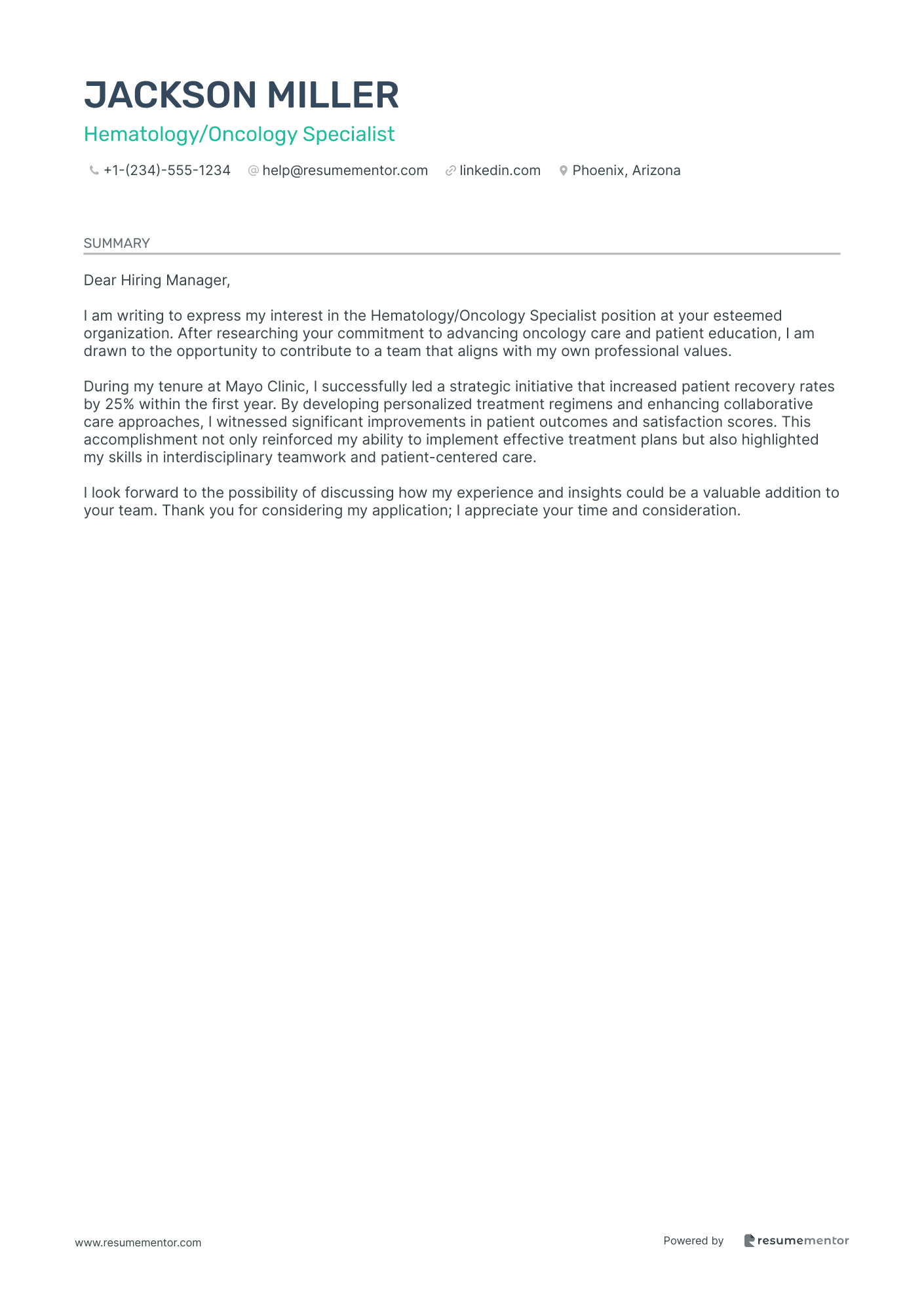
Hematology/Oncology Specialist
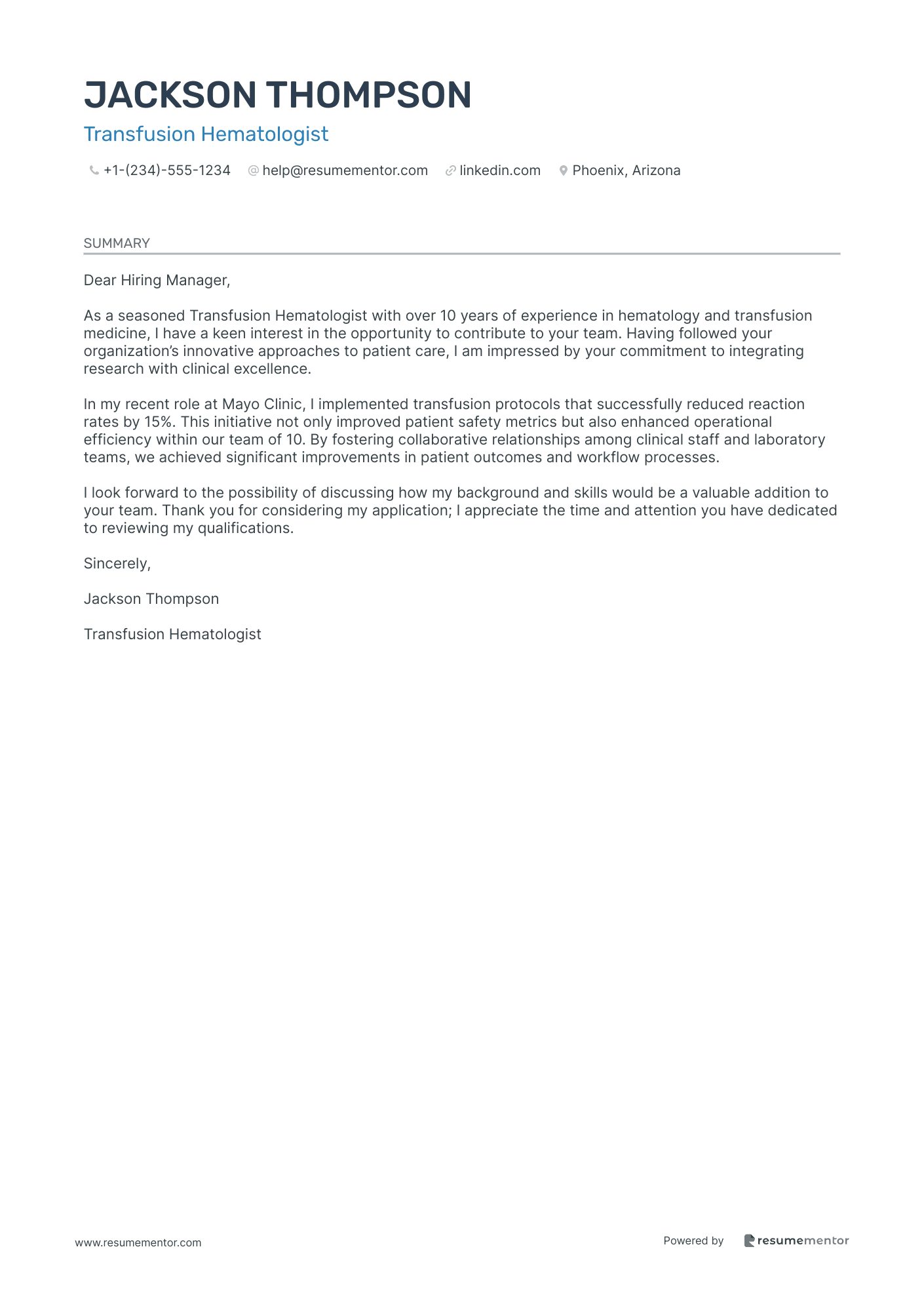
Transfusion Hematologist
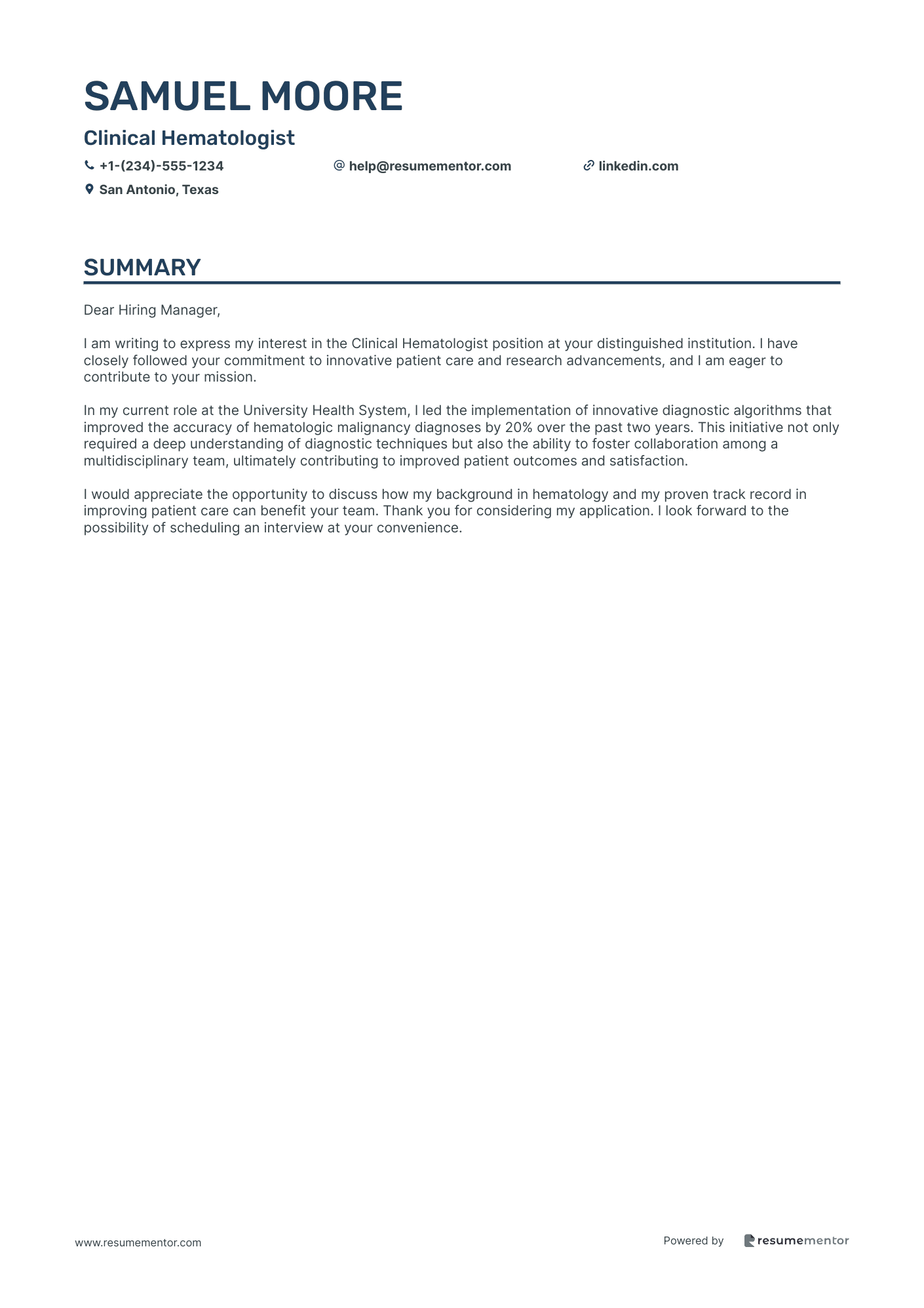
Clinical Hematologist
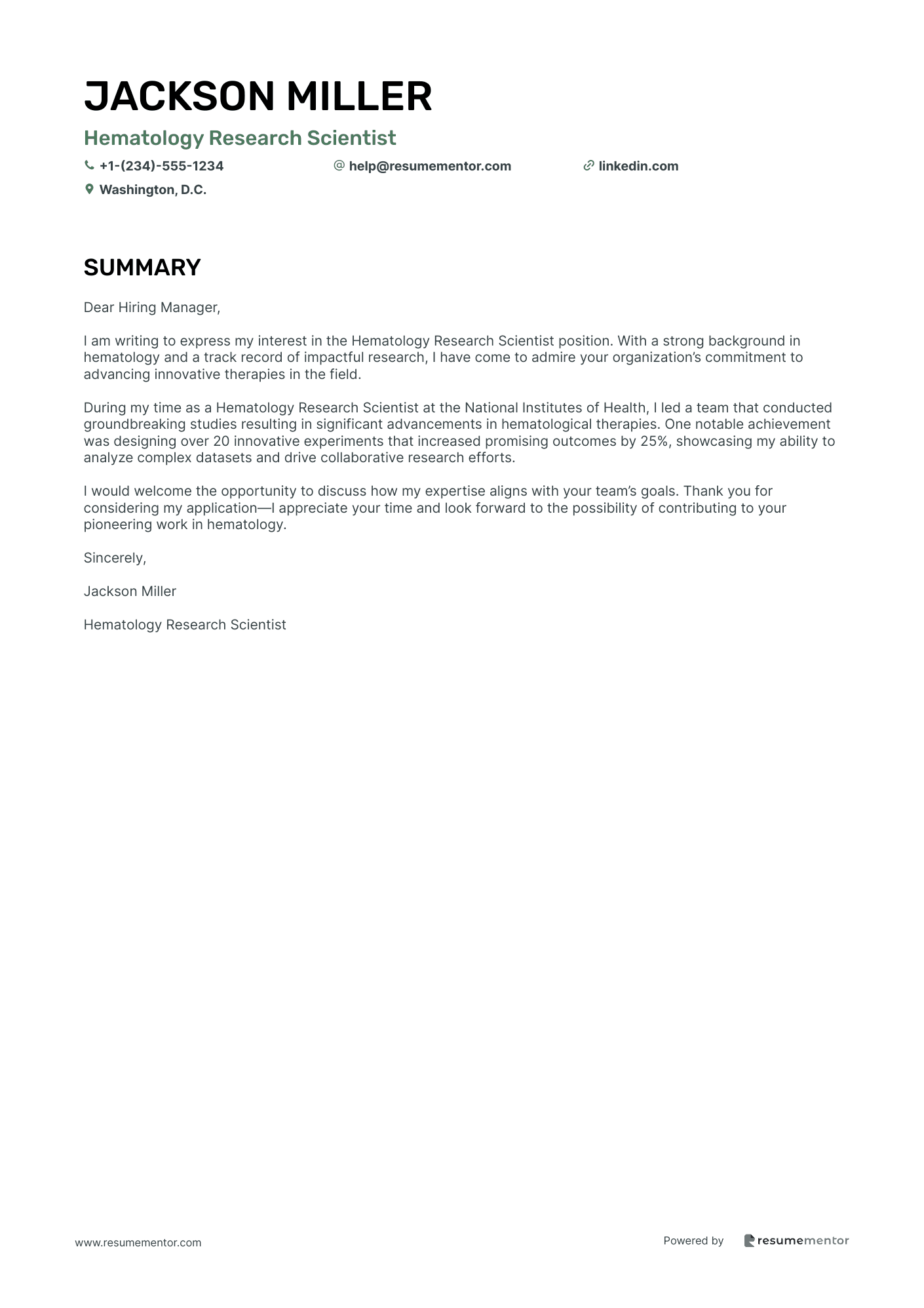
Hematology Research Scientist
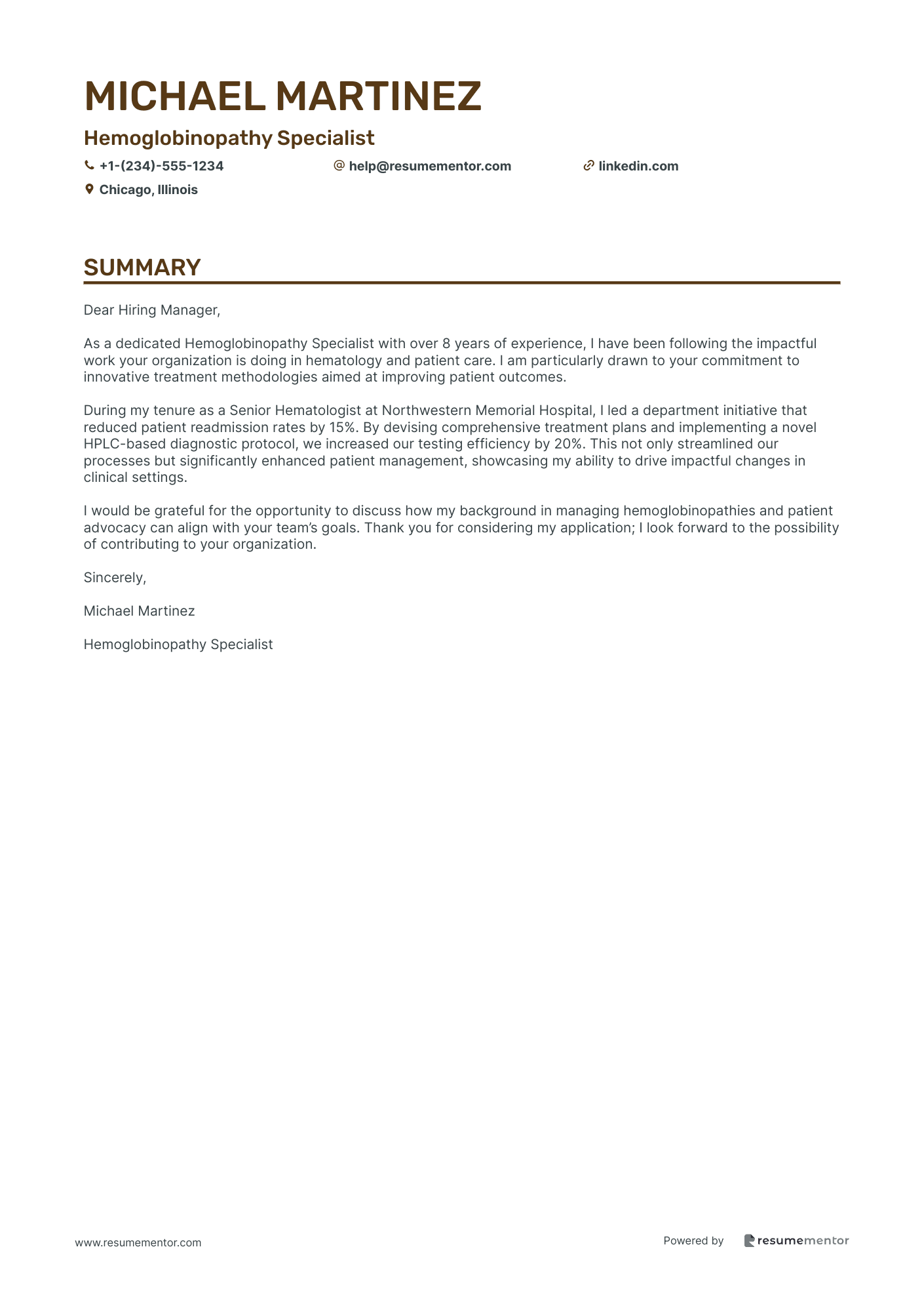
Hemoglobinopathy Specialist
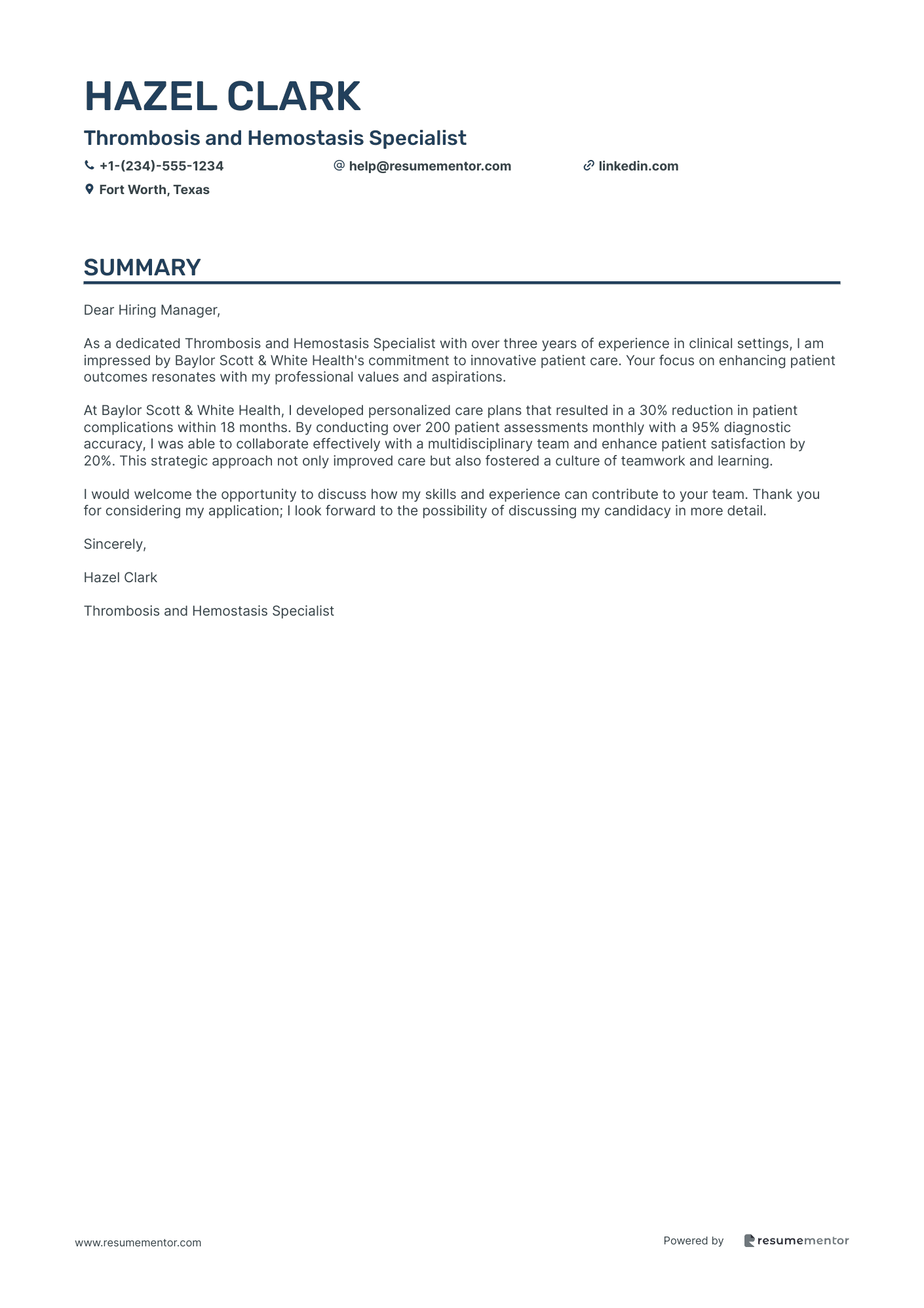
Thrombosis and Hemostasis Specialist
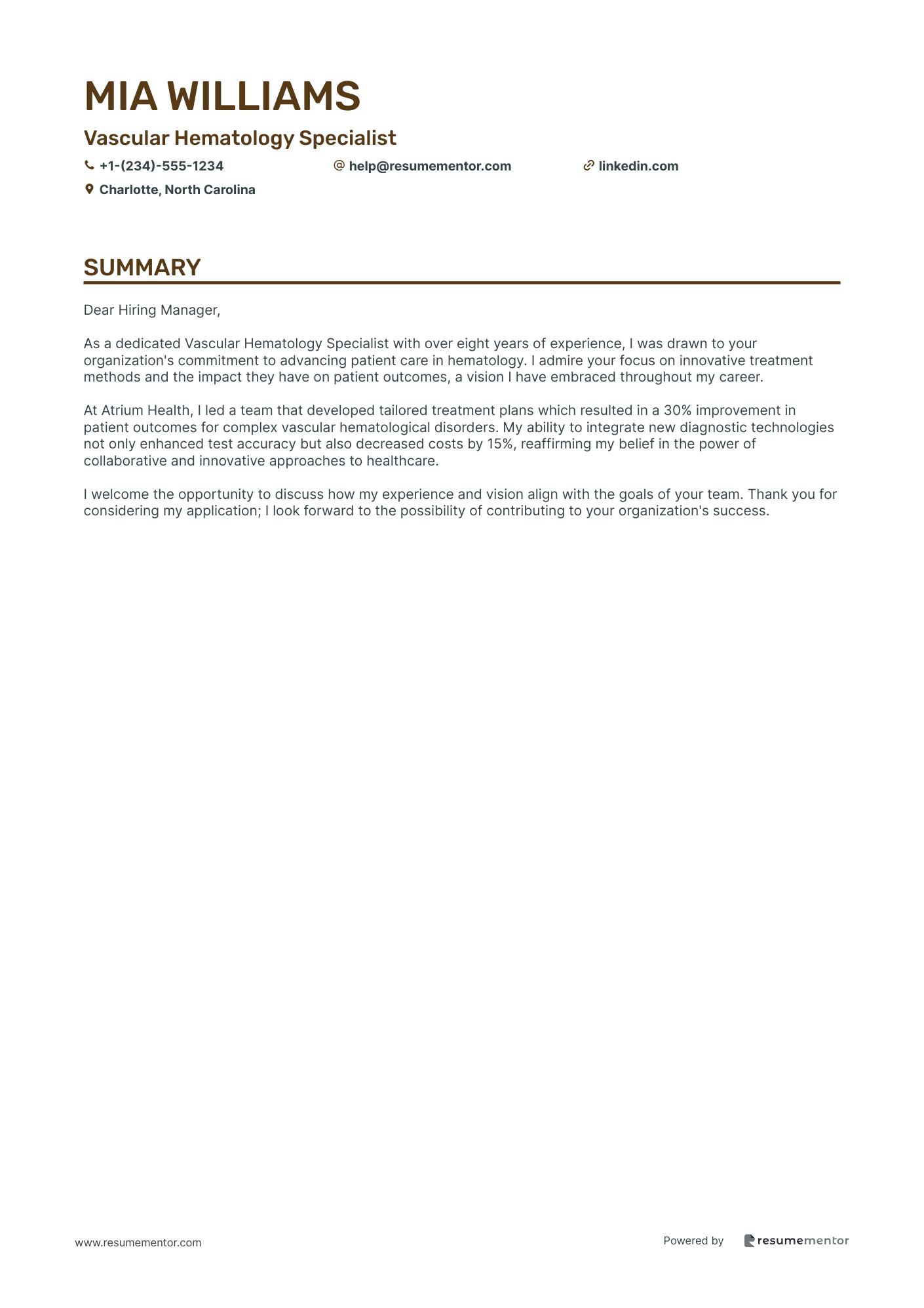
Vascular Hematology Specialist
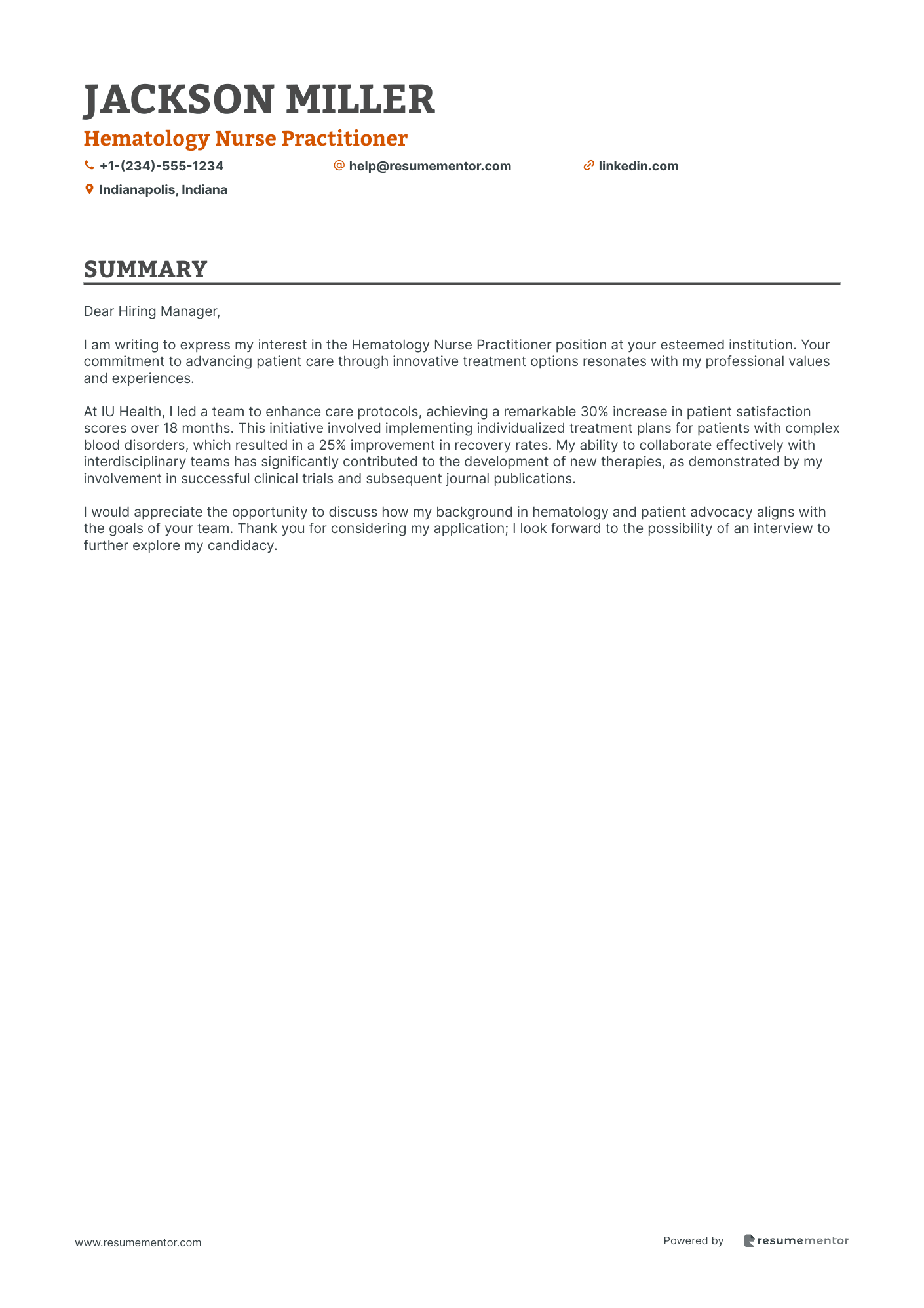
Hematology Nurse Practitioner
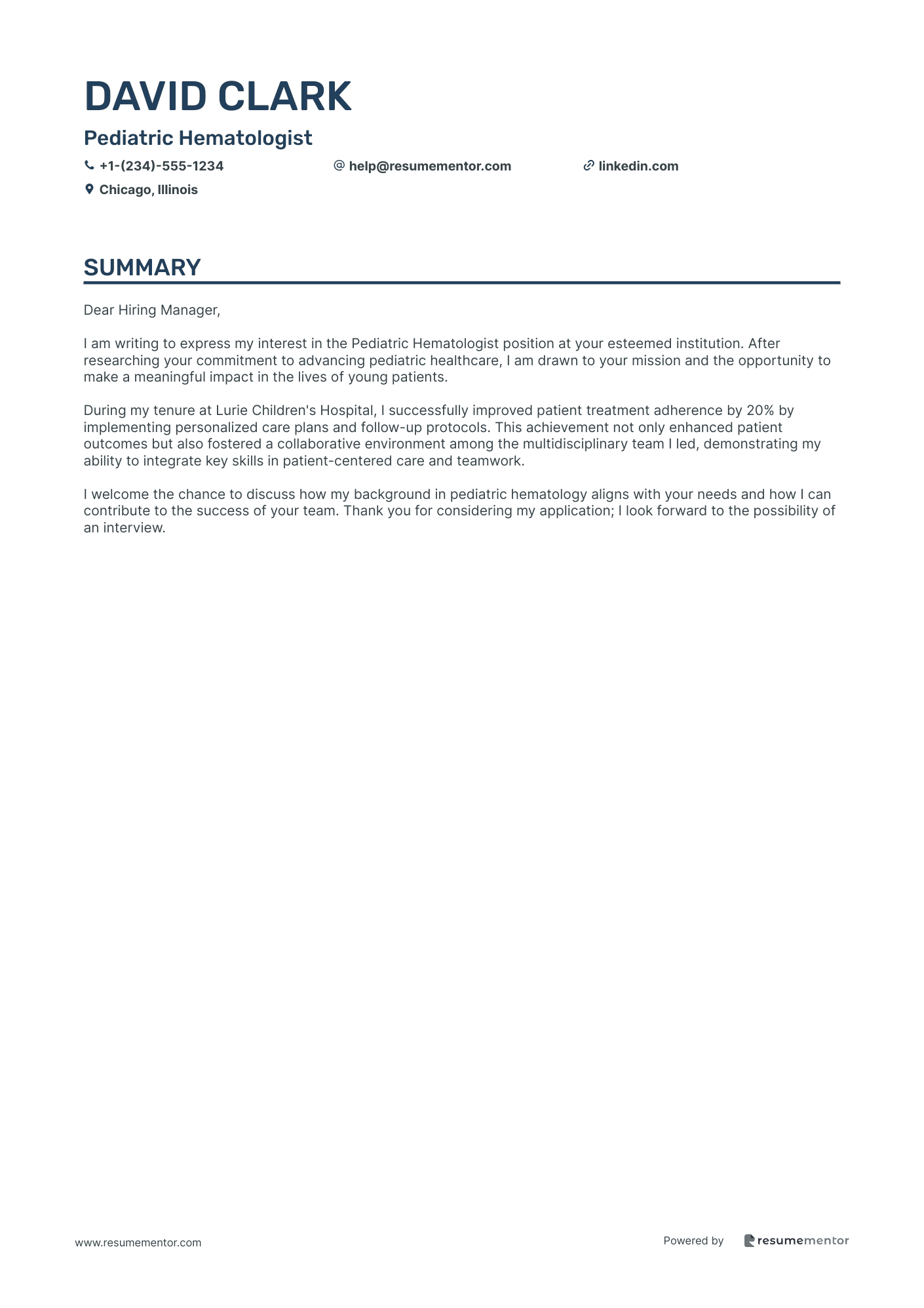
Pediatric Hematologist

Hematology/Oncology Specialist cover letter sample
When crafting your cover letter, focus on your clinical experience in treating patients with blood disorders and cancers. Highlight your ability to interpret laboratory results and develop effective treatment plans. It’s essential to emphasize your teamwork in multidisciplinary settings, showcasing how collaboration improved patient outcomes. Include any specialized training or certifications in hematology or oncology, and mention specific patient success stories that illustrate your skills. Demonstrating a patient-centered approach and effective communication with patients and families will strengthen your application significantly.
Jackson Miller
Hematology/Oncology Specialist
Summary
Dear Hiring Manager,
I am writing to express my interest in the Hematology/Oncology Specialist position at your esteemed organization. After researching your commitment to advancing oncology care and patient education, I am drawn to the opportunity to contribute to a team that aligns with my own professional values.
During my tenure at Mayo Clinic, I successfully led a strategic initiative that increased patient recovery rates by 25% within the first year. By developing personalized treatment regimens and enhancing collaborative care approaches, I witnessed significant improvements in patient outcomes and satisfaction scores. This accomplishment not only reinforced my ability to implement effective treatment plans but also highlighted my skills in interdisciplinary teamwork and patient-centered care.
I look forward to the possibility of discussing how my experience and insights could be a valuable addition to your team. Thank you for considering my application; I appreciate your time and consideration.
Transfusion Hematologist cover letter sample
When applying for this role, highlight your clinical experience in blood banking and transfusion practices. Emphasize any certifications or training you have in hematology, such as 'Transfusion Medicine Training' or 'Hemostasis and Thrombosis Workshop.' Showcase your proficiency in laboratory techniques and patient management. Provide specific examples that demonstrate your ability to make informed decisions in critical situations. Use the 'skill-action-result' framework to illustrate how your expertise has positively affected patient outcomes or streamlined operations in previous roles.
Jackson Thompson
Transfusion Hematologist
Summary
Dear Hiring Manager,
As a seasoned Transfusion Hematologist with over 10 years of experience in hematology and transfusion medicine, I have a keen interest in the opportunity to contribute to your team. Having followed your organization’s innovative approaches to patient care, I am impressed by your commitment to integrating research with clinical excellence.
In my recent role at Mayo Clinic, I implemented transfusion protocols that successfully reduced reaction rates by 15%. This initiative not only improved patient safety metrics but also enhanced operational efficiency within our team of 10. By fostering collaborative relationships among clinical staff and laboratory teams, we achieved significant improvements in patient outcomes and workflow processes.
I look forward to the possibility of discussing how my background and skills would be a valuable addition to your team. Thank you for considering my application; I appreciate the time and attention you have dedicated to reviewing my qualifications.
Sincerely,
Jackson Thompson
Transfusion Hematologist
Clinical Hematologist cover letter sample
When crafting your cover letter, highlight your experience in diagnosing and treating blood disorders. Emphasize any fellowships or specialized training in hematology, including the duration and focus areas. Showcase your ability to interpret laboratory results and manage patient care plans effectively. Include examples of how your clinical skills improved patient outcomes or enhanced teamwork in multidisciplinary settings. Mention involvement in research or clinical trials that contributed to advancements in treatment, demonstrating your commitment to the field and continuous learning.
Samuel Moore
Clinical Hematologist
Summary
Dear Hiring Manager,
I am writing to express my interest in the Clinical Hematologist position at your distinguished institution. I have closely followed your commitment to innovative patient care and research advancements, and I am eager to contribute to your mission.
In my current role at the University Health System, I led the implementation of innovative diagnostic algorithms that improved the accuracy of hematologic malignancy diagnoses by 20% over the past two years. This initiative not only required a deep understanding of diagnostic techniques but also the ability to foster collaboration among a multidisciplinary team, ultimately contributing to improved patient outcomes and satisfaction.
I would appreciate the opportunity to discuss how my background in hematology and my proven track record in improving patient care can benefit your team. Thank you for considering my application. I look forward to the possibility of scheduling an interview at your convenience.
Hematology Research Scientist cover letter sample
When crafting your cover letter, it’s essential to highlight your experience in laboratory techniques and data analysis. Detail any previous work with blood samples, assays, or cell cultures. If you’ve published research or contributed to publications, include this to demonstrate your expertise. Mention any relevant conferences attended or presentations given to show your engagement in the field. Also, describe your ability to collaborate on multidisciplinary teams, focusing on how your contributions have advanced research projects and led to significant findings.
Jackson Miller
Hematology Research Scientist
Summary
Dear Hiring Manager,
I am writing to express my interest in the Hematology Research Scientist position. With a strong background in hematology and a track record of impactful research, I have come to admire your organization’s commitment to advancing innovative therapies in the field.
During my time as a Hematology Research Scientist at the National Institutes of Health, I led a team that conducted groundbreaking studies resulting in significant advancements in hematological therapies. One notable achievement was designing over 20 innovative experiments that increased promising outcomes by 25%, showcasing my ability to analyze complex datasets and drive collaborative research efforts.
I would welcome the opportunity to discuss how my expertise aligns with your team’s goals. Thank you for considering my application—I appreciate your time and look forward to the possibility of contributing to your pioneering work in hematology.
Sincerely,
Jackson Miller
Hematology Research Scientist
Hemoglobinopathy Specialist cover letter sample
When crafting your cover letter, emphasize your clinical experience working with patients who have blood disorders. Detail any specialized training or certifications in hematology or genetics, as these will showcase your expertise. Highlight your ability to work in multidisciplinary teams, demonstrating collaboration with other healthcare professionals. Include examples of how your interventions have improved patient outcomes or reduced complications, using quantifiable data when possible. This approach not only reflects your skills but also shows your commitment to enhancing patient care.
Michael Martinez
Hemoglobinopathy Specialist
Summary
Dear Hiring Manager,
As a dedicated Hemoglobinopathy Specialist with over 8 years of experience, I have been following the impactful work your organization is doing in hematology and patient care. I am particularly drawn to your commitment to innovative treatment methodologies aimed at improving patient outcomes.
During my tenure as a Senior Hematologist at Northwestern Memorial Hospital, I led a department initiative that reduced patient readmission rates by 15%. By devising comprehensive treatment plans and implementing a novel HPLC-based diagnostic protocol, we increased our testing efficiency by 20%. This not only streamlined our processes but significantly enhanced patient management, showcasing my ability to drive impactful changes in clinical settings.
I would be grateful for the opportunity to discuss how my background in managing hemoglobinopathies and patient advocacy can align with your team’s goals. Thank you for considering my application; I look forward to the possibility of contributing to your organization.
Sincerely,
Michael Martinez
Hemoglobinopathy Specialist
Thrombosis and Hemostasis Specialist cover letter sample
When applying for this role, it’s important to showcase any relevant experience in hematology or related fields. Highlight your proficiency in laboratory techniques and your understanding of coagulation disorders. Certifications or training, such as Good Laboratory Practice, should be noted to demonstrate your commitment to quality standards. Include specific instances where your skills led to improved patient outcomes or streamlined processes in previous positions. Using the 'skill-action-result' format can effectively illustrate how you’ve made a positive impact in your previous roles.
Hazel Clark
Thrombosis and Hemostasis Specialist
Summary
Dear Hiring Manager,
As a dedicated Thrombosis and Hemostasis Specialist with over three years of experience in clinical settings, I am impressed by Baylor Scott & White Health's commitment to innovative patient care. Your focus on enhancing patient outcomes resonates with my professional values and aspirations.
At Baylor Scott & White Health, I developed personalized care plans that resulted in a 30% reduction in patient complications within 18 months. By conducting over 200 patient assessments monthly with a 95% diagnostic accuracy, I was able to collaborate effectively with a multidisciplinary team and enhance patient satisfaction by 20%. This strategic approach not only improved care but also fostered a culture of teamwork and learning.
I would welcome the opportunity to discuss how my skills and experience can contribute to your team. Thank you for considering my application; I look forward to the possibility of discussing my candidacy in more detail.
Sincerely,
Hazel Clark
Thrombosis and Hemostasis Specialist
Vascular Hematology Specialist cover letter sample
When preparing your application, focus on your clinical experience with blood disorders and vascular health. Detail any hands-on training or fellowships you've completed in this area. Highlight your familiarity with diagnostic tools and treatment protocols. Emphasize your ability to work collaboratively with multidisciplinary teams. Mention any research you’ve conducted or published papers that showcase your knowledge. Include examples where you improved patient outcomes or streamlined processes, using a clear 'skill-action-result' framework to demonstrate your effectiveness and dedication in this specialized field.
Mia Williams
Vascular Hematology Specialist
Summary
Dear Hiring Manager,
As a dedicated Vascular Hematology Specialist with over eight years of experience, I was drawn to your organization's commitment to advancing patient care in hematology. I admire your focus on innovative treatment methods and the impact they have on patient outcomes, a vision I have embraced throughout my career.
At Atrium Health, I led a team that developed tailored treatment plans which resulted in a 30% improvement in patient outcomes for complex vascular hematological disorders. My ability to integrate new diagnostic technologies not only enhanced test accuracy but also decreased costs by 15%, reaffirming my belief in the power of collaborative and innovative approaches to healthcare.
I welcome the opportunity to discuss how my experience and vision align with the goals of your team. Thank you for considering my application; I look forward to the possibility of contributing to your organization's success.
Hematology Nurse Practitioner cover letter sample
When applying, focus on your clinical experience in hematology and oncology settings. Highlight your ability to perform assessments, interpret lab results, and develop care plans tailored to patients’ needs. Include any specialized certifications, such as chemotherapy administration or advanced practice nursing credentials. Discuss your proficiency in patient education and communication, showcasing examples where you improved patient adherence or health outcomes. Use metrics to illustrate your achievements, such as reduced hospital readmission rates or improved patient satisfaction scores, to demonstrate your impact in previous roles.
Jackson Miller
Hematology Nurse Practitioner
Summary
Dear Hiring Manager,
I am writing to express my interest in the Hematology Nurse Practitioner position at your esteemed institution. Your commitment to advancing patient care through innovative treatment options resonates with my professional values and experiences.
At IU Health, I led a team to enhance care protocols, achieving a remarkable 30% increase in patient satisfaction scores over 18 months. This initiative involved implementing individualized treatment plans for patients with complex blood disorders, which resulted in a 25% improvement in recovery rates. My ability to collaborate effectively with interdisciplinary teams has significantly contributed to the development of new therapies, as demonstrated by my involvement in successful clinical trials and subsequent journal publications.
I would appreciate the opportunity to discuss how my background in hematology and patient advocacy aligns with the goals of your team. Thank you for considering my application; I look forward to the possibility of an interview to further explore my candidacy.
Pediatric Hematologist cover letter sample
When crafting your cover letter, focus on relevant clinical experiences, particularly with children and hematological conditions. Highlight any specialized training, such as fellowships in pediatric hematology or certifications in pediatric care. Stress your skills in collaborating with multidisciplinary teams to provide comprehensive care. Include examples where your interventions led to improved patient outcomes, using a 'skill-action-result' format. Demonstrating empathy and effective communication with patients and families is essential. Show how your approach has built trust and facilitated better health decisions in your previous roles.
David Clark
Pediatric Hematologist
Summary
Dear Hiring Manager,
I am writing to express my interest in the Pediatric Hematologist position at your esteemed institution. After researching your commitment to advancing pediatric healthcare, I am drawn to your mission and the opportunity to make a meaningful impact in the lives of young patients.
During my tenure at Lurie Children's Hospital, I successfully improved patient treatment adherence by 20% by implementing personalized care plans and follow-up protocols. This achievement not only enhanced patient outcomes but also fostered a collaborative environment among the multidisciplinary team I led, demonstrating my ability to integrate key skills in patient-centered care and teamwork.
I welcome the chance to discuss how my background in pediatric hematology aligns with your needs and how I can contribute to the success of your team. Thank you for considering my application; I look forward to the possibility of an interview.
Related Articles

Continue Reading
Check more recommended readings to get the job of your dreams.
Resume
Resources
Tools
© 2026. All rights reserved.
Made with love by people who care.
